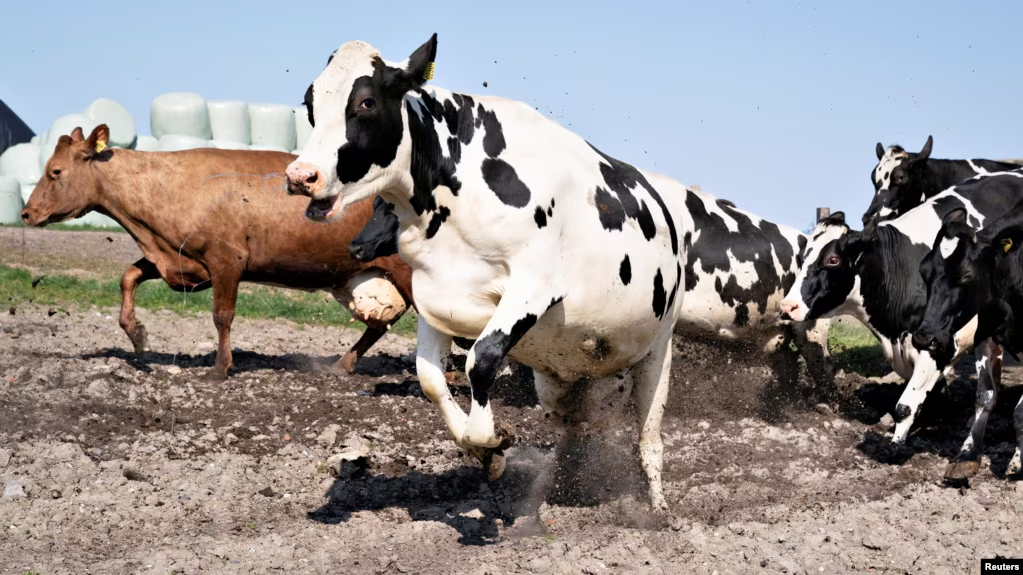Cows, Pigs Face Carbon Tax in Denmark
Cows, Pigs Face Carbon Tax in Denmark
今回は、デンマークが家畜の炭素税を導入するというニュースです。最近では、carbon (炭素)やmethane(メタン)といった単語を耳にする機会が増えましたね。本文では、この税の導入背景や世界への影響について詳しく解説されています。その他にも、climate neutral(気候中立)やclimate change(気候変動) carbon dioxide (二酸化炭素)など、現代の環境問題を語る上で欠かせない単語も登場しますので、覚えておきましょう。

1.Article
Directions: Read the following article aloud.
Denmark will tax farm animals such as cattle and pigs for releasing methane, a kind of greenhouse gas, starting in 2030.
Some scientists think that greenhouse gases trap heat in the Earth’s atmosphere causing rising temperatures.
The European country is the first in the world to agree to such measures targeting greenhouse gas emissions.
Taxation Minister Jeppe Bruus said the aim is to reduce Danish greenhouse gas emissions by 70 percent from 1990 levels by 2030.
Danish farmers will be taxed about $43 per ton of carbon dioxide equivalent in 2030. However, because of an income tax deduction of 60 percent, the actual cost per ton will start at $17.30 and increase to $43 by 2035.
Carbon dioxide usually gets more attention for its part in climate change. But the U.S. National Oceanic and Atmospheric Administration says methane traps about 87 times more heat over on a 20-year timescale under some conditions. Methane is emitted from landfills, oil and natural gas systems and farm animals. Scientists say it has increased quickly since 2020. The United Nations Environment Program says 32 percent of human-caused methane comes from farm animals.
Bruus said, “We will take a big step closer in becoming climate neutral in 2045.” He added that Denmark “will be the first country in the world to introduce a real CO2 tax on agriculture” and hoped other countries would follow.
New Zealand passed a similar law that was to take effect in 2025. However, the legislation was recently removed after farmers criticized the measure. There was also a change of government following the 2023 election. New Zealand said it would not include agriculture in its emissions trading policy and would look for other ways to reduce methane.
In Denmark, the center-right government reached the tax agreement after meeting with farmers, business representatives, labor organizations, and others.
Denmark’s move comes after months of protests by farmers across Europe against climate change measures. The rules, they say, could drive them out of business.
It described the tax agreement as “a historic compromise.”
Maria Reumert Gjerding, head of the organization said, “We have succeeded in landing a compromise on a CO2 tax, which lays the groundwork for a restructured food industry -– also on the other side of 2030.”
An average cow in Denmark is believed to produce the equivalent of about six metric tons of CO2 yearly. The government of Denmark said that there were nearly 1.5 million cattle in the country in 2022. The Scandinavian country is a large dairy and pork exporter. Denmark also will tax pigs although they produce far less emissions than cows.
The tax is to be approved in the 179-seat parliament. The bill is expected to pass.
I’m Mario Ritter, Jr.
Some scientists think that greenhouse gases trap heat in the Earth’s atmosphere causing rising temperatures.
The European country is the first in the world to agree to such measures targeting greenhouse gas emissions.
Taxation Minister Jeppe Bruus said the aim is to reduce Danish greenhouse gas emissions by 70 percent from 1990 levels by 2030.
Danish farmers will be taxed about $43 per ton of carbon dioxide equivalent in 2030. However, because of an income tax deduction of 60 percent, the actual cost per ton will start at $17.30 and increase to $43 by 2035.
Carbon dioxide usually gets more attention for its part in climate change. But the U.S. National Oceanic and Atmospheric Administration says methane traps about 87 times more heat over on a 20-year timescale under some conditions. Methane is emitted from landfills, oil and natural gas systems and farm animals. Scientists say it has increased quickly since 2020. The United Nations Environment Program says 32 percent of human-caused methane comes from farm animals.
Bruus said, “We will take a big step closer in becoming climate neutral in 2045.” He added that Denmark “will be the first country in the world to introduce a real CO2 tax on agriculture” and hoped other countries would follow.
New Zealand passed a similar law that was to take effect in 2025. However, the legislation was recently removed after farmers criticized the measure. There was also a change of government following the 2023 election. New Zealand said it would not include agriculture in its emissions trading policy and would look for other ways to reduce methane.
In Denmark, the center-right government reached the tax agreement after meeting with farmers, business representatives, labor organizations, and others.
Denmark’s move comes after months of protests by farmers across Europe against climate change measures. The rules, they say, could drive them out of business.
It described the tax agreement as “a historic compromise.”
Maria Reumert Gjerding, head of the organization said, “We have succeeded in landing a compromise on a CO2 tax, which lays the groundwork for a restructured food industry -– also on the other side of 2030.”
An average cow in Denmark is believed to produce the equivalent of about six metric tons of CO2 yearly. The government of Denmark said that there were nearly 1.5 million cattle in the country in 2022. The Scandinavian country is a large dairy and pork exporter. Denmark also will tax pigs although they produce far less emissions than cows.
The tax is to be approved in the 179-seat parliament. The bill is expected to pass.
I’m Mario Ritter, Jr.
Jan Olsen reported this story for The Associated Press. Hai Do adapted the report for VOA Learning English.
Source:Cows, Pigs Face Carbon Tax in Denmark
VOA
本教材は、the U.S. Agency for Global Mediaより許諾を得て、産経ヒューマンラーニング株式会社が編集しています。
テキストの無断転載・無断使用を固く禁じます 。
